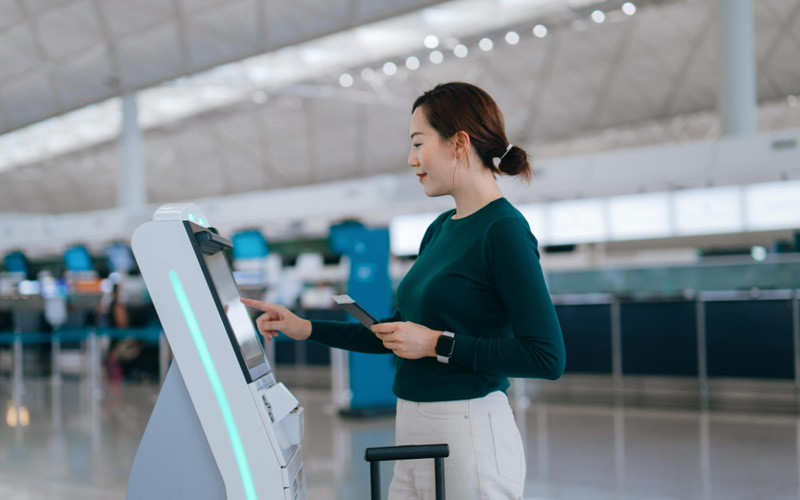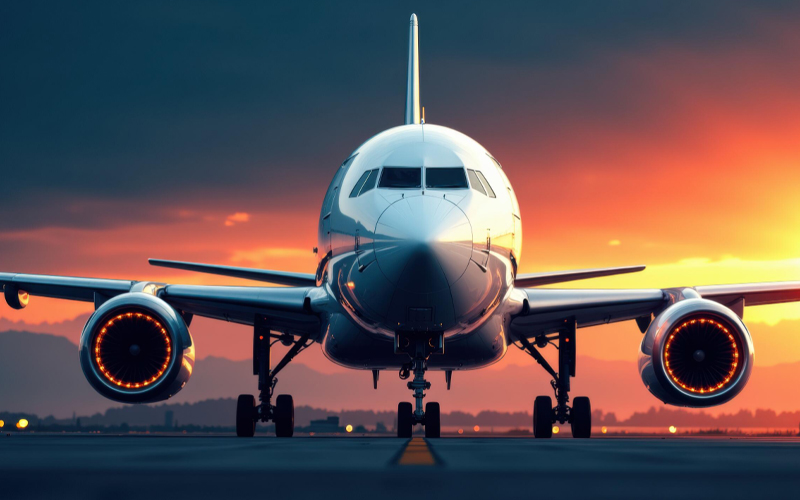Artificial Intelligence (AI) is transforming aviation, enhancing aircraft design, maintenance, and passenger experience. Airlines and aviation businesses are increasingly relying on AI-driven solutions to optimise logistics, enhance safety, and improve operational efficiency. As a result, the global artificial intelligence in aviation market is set to grow from $5.96 million in 2025 to $20.63 million in 2034 at a CAGR of 14.8%. This rapid growth highlights the role of AI in the aviation industry, helping streamline operations while improving cost efficiency, sustainability, and overall reliability. However, it is crucial to acknowledge that while AI enhances efficiency, a balanced approach is necessary to avoid over-reliance on technology.
Use cases of artificial intelligence in the aviation industry
The applications of AI in aviation logistics are multifaceted, from reducing paperwork and optimising flight routes to predictive maintenance and baggage handling. By leveraging AI-driven automation, airlines can enhance precision, lower operational costs, and streamline logistics.
Today, outsourcing in the hospitality industry is viewed as an auxiliary tool to align operational frameworks with institutional objectives. The objective is to ensure that resources are consistently directed towards improving the bottom line while delivering experiences aligned with customer expectations.
Areas of opportunity
Outsourcing in the hospitality industry is a time-tested response to shifting market sentiments for businesses. It has allowed hospitality businesses the room to transform how guests interact with them and experience their services.
Automating documentation and data discovery
Aviation logistics involve vast amounts of paperwork, from flight logs to maintenance records and inventory management. AI-powered tools can automate document processing and extract key insights from structured and unstructured data, streamlining compliance reporting while reducing administrative overhead.
Optimising flight routes and predicting delays
Integrating artificial intelligence in aviation logistics management, airlines can analyse vast datasets, including real-time weather updates, air traffic conditions, and fuel efficiency metrics, to determine the most efficient flight paths. Moreover, machine learning models can also predict potential delays due to weather disturbances and reroute flights dynamically to avoid disruptions.
Enhancing crew and human resource management
AI in the aviation industry optimises flight crew allocation, improving efficiency. Predictive analytics tools can assess crew availability, duty hours, scheduling constraints, and equipment familiarity, reducing instances of fatigue and ensuring compliance with aviation safety regulations.
Revolutionising aircraft maintenance with predictive analytics
Artificial intelligence in aircraft maintenance is giving way to predictive maintenance, preventing costly breakdowns and extending the operational lifespan of aircraft. Machine learning models analyse real-time sensor data to predict failures, identify wear and tear patterns, schedule proactive maintenance, reduce downtime, and minimise disruptions. Additionally, AI in the aviation industry can also help optimise inventory management, ensuring the availability of spare parts based on actual usage patterns of individual aircraft.
Improving safety and security with real-time monitoring
Lost baggage and delayed cargo remain persistent challenges in the aviation industry. AI-powered tracking systems can improve accuracy and efficiency in baggage handling, reducing mishandling events. Smart logistics solutions can also optimise loading and routing, ensuring a smoother transition, enhancing security checks, and minimising disruptions.
Enhancing passenger experience
AI in the aviation industry is also redefining passenger journeys, offering personalised travel planning, automated check-ins, and dynamic pricing models. From streamlining booking and check-in processes to analysing customer feedback to tailor services, artificial intelligence in aviation is playing a key role in reducing wait times and enhancing customer satisfaction.
Infosys BPM offers cutting-edge airline cargo business process management solutions, enabling airlines to harness the potential of artificial intelligence in aviation logistics management. From automating key cargo operations – such as quotes and rate management, booking and customer support, and contract management – to leveraging advanced data-driven insights, Infosys BPM enhances aviation logistics. Its AI-powered solutions can help airlines optimise space utilisation, provide operational analytics, improve cargo IQ reporting, and streamline revenue accounting, ultimately boosting efficiency, reducing costs, and enhancing customer experience. By integrating AI-driven analytics and automation, airlines can achieve seamless logistics management while maintaining high service standards.
Key challenges of integrating artificial intelligence in aviation
While AI in the aviation industry brings significant advancements and benefits, airlines must address key challenges to ensure smooth AI adoption.
• Data management: Managing vast volumes of structured and unstructured data.
• Accuracy and reliability: Ensuring AI models provide precise predictions.
• Scalability and safety: Implementing AI solutions without compromising aviation security.
• Data security: Protecting sensitive aviation data from cyber threats.
• Regulatory compliance: Aligning AI solutions with aviation industry regulations.
• Integration complexity: Seamlessly integrating AI with existing aviation systems.
• Workforce adaptation: Managing job displacement and reskilling employees.
Addressing these challenges requires a strategic approach, combining AI innovation with robust policies and regulations.
Conclusion
Artificial intelligence in the aviation industry is reshaping logistics management, offering smarter, more efficient solutions for airlines worldwide. From predictive maintenance and optimised flight routes to enhanced airline safety and passenger experience, AI-driven innovations are improving operational efficiency and safety. While challenges exist, leveraging AI strategically can help ensure a seamless, tech-driven future for aviation logistics.








